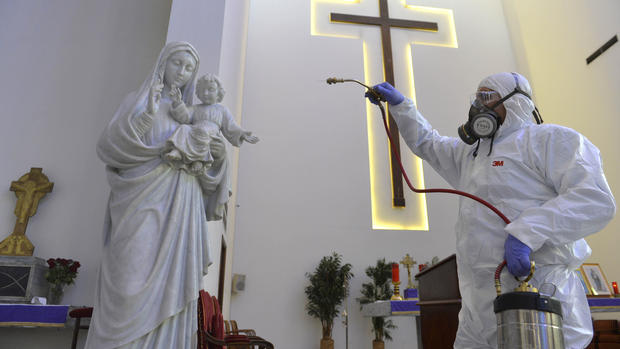Will warm weather stop the spread of coronavirus?
[ad_1]
Every year, people across America cheer the start of spring, not only because it ushers in warmer weather, but because it most often marks the end of flu season. So it stands to reason that Americans are now wondering whether spring will also serve to blunt the current coronavirus outbreak.
President Trump raised the possibility himself last month, suggesting that “a lot of people think it goes away in April with the heat” — though top federal health officials said it was too early to know what this virus would do.
Dr. Gregory Gray, of Duke University’s Global Health Institute Division of Infectious Diseases, tells CBS News that the summer months may lead to a small decrease in transmission, but likely won’t stop the spread of coronavirus completely.
“It is hard to know,” Dr. Gray said. “Routinely seen coronaviruses often wane during summer months as buildings have more air circulation, [people] tend to congregate less, and people are more exposed to UV light which can kill viruses.”
However, he said this particular coronavirus, known as SARS-CoV2, “is pretty infectious — meaning it has a high basic reproduction number — and virtually 100% of people are susceptible. My hunch is we may see a 10% to 20% slowdown in transmission, but I doubt the virus will cease infecting people during summer months.”
It is also important to remember that just because it starts getting warmer in the U.S. doesn’t mean it’s warm elsewhere.
“The virus will soon be very active in both the Southern and Northern Hemispheres, which have opposing summers and winters,” Gray explains. “Hence, a summer slowdown in the Northern Hemisphere may be offset with a concomitant winter increase in the Southern Hemisphere.”
The CDC’s website says it is not yet known whether weather and temperature will impact the spread of coronavirus. It also points out that even though you are statistically less likely to get sick with cold or flu viruses during the summer, it’s still possible to come down with them any time of the year.
“Some other viruses, like the common cold and flu, spread more during cold weather months but that does not mean it is impossible to become sick with these viruses during other months,” the CDC says. “At this time, it is not known whether the spread of COVID-19 [the illness caused by the coronavirus] will decrease when weather becomes warmer. There is much more to learn about the transmissibility, severity, and other features associated with COVID-19 and investigations are ongoing.”
[ad_2]
Source link











